WAR CRY



Wynne and Joanna set sail round the Welsh coastline
Burns Night celebrates Scotland’s supper man
The Salvation Army is a Christian church and registered charity seeking to share the good news of Jesus and nurture committed followers of him. We also serve people without discrimination, care for creation and seek justice and reconciliation. We offer practical support and services in more than 700 centres throughout the UK. Go to salvationarmy.org.uk/find-a-church to find your nearest centre.
The Salvation Army first published a newspaper called the War Cry in London in December 1879, and we have continued to appear every week since then. Our name refers to our battle for people’s hearts and souls as we promote the positive impact of the Christian faith and The Salvation Army’s fight for greater social justice.
Editor: Andrew Stone, Major
Deputy Editor: Philip Halcrow
Staff Writer: Emily Bright
Staff Writer: Claire Brine
Staff Writer: Ewan Hall
Editorial Assistant: Linda McTurk
Graphic Designer: Mark Knight
Graphic Designer: Natalie Adkins
Email: warcry@salvationarmy.org.uk
The Salvation Army United Kingdom and Ireland Territory
1 Champion Park London SE5 8FJ
Tel: 0845 634 0101
Subscriptions: 01933 445445 (option 1, option 1) or email: subscriptions@satcol.org
Founders: William and Catherine Booth
International leaders: General Lyndon Buckingham and Commissioner Bronwyn Buckingham
Territorial leaders: Commissioners Jenine and Paul Main
Editor-in-Chief: Major Julian Watchorn
Published weekly by The Salvation Army © The Salvation Army United Kingdom and Ireland Territory ISSN 0043-0226
The life and works of Robert Burns will be remembered this weekend. As we report in this week’s War Cry, poems will be read, haggises eaten and there may even be the sound of a bagpipe or two.
Scotland’s bard was born on 25 January 1759, but the annual suppers held in his honour help to keep his memory and words alive. It can be beneficial to look back – even if it means recalling bad times. In this week’s issue we tell the story of the opposition that The Salvation Army faced when it began in the 19th century.
Remembering the determination of other people to endure even when under attack can inspire us to keep going when we face tough situations.
However, there are other events that should be remembered because they serve as a warning of how humankind is capable of evil if left unchecked. Monday 27 January is Holocaust Memorial Day, which this year marks the 80th anniversary of the liberation of Auschwitz.
In this issue we hear the story of the Ten Boom family who, in 1940s Holland, helped Jews to escape persecution and murder at the hands of the Nazis. When the family were caught, sisters Corrie and Betsie were imprisoned in a concentration camp, where Betsie died.
Corrie survived, and after the war spent much of the rest of her life travelling the world, spreading the Christian message of peace, reconciliation and the difference that Jesus can make to a person.
Ellen de Kroon Stamps, who spent seven years as Corrie’s secretary, tells us: ‘She would always say: “There is no pit so deep that Jesus is not deeper still.”’
When Christians look back and remember their experiences, they will know that, however hard life may have seemed, Jesus will have always been with them.
The Salvation Army Trust is a registered charity. The charity number in England, Wales and Northern Ireland is 214779, in Scotland SC009359 and in the Republic of Ireland CHY6399. Printed by CKN Print, Northampton, on sustainably sourced paper


Your local Salvation Army centre


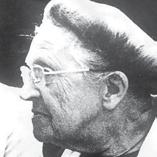


During their voyage
Wynne and Joanna chat about life
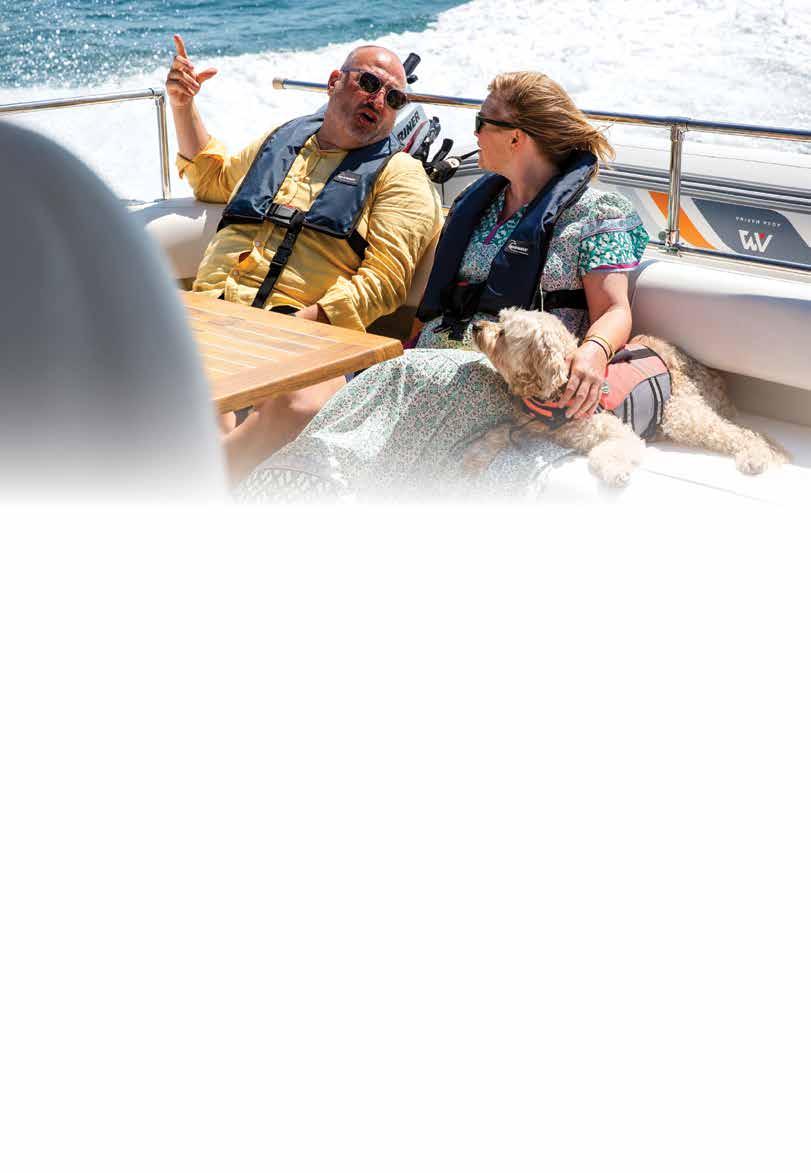
TV preview: Wynne and Joanna: All at Sea Mondays BBC1 and iPlayer
By Claire Brine
One boat plus two pals equals an opportunity for adventure. In BBC1’s Wynne and Joanna: All at Sea, opera singer Wynne Evans and the actress Joanna Page are setting sail round the coast of Wales, keen to explore the country they call home.
Even before the pair climb aboard their vessel – captained by experienced skipper Wayne – Joanna is excited about the voyage. As a busy mum of four children, she intends to use her time on the water to rest and recharge.
‘I want to do this trip because I just want to get away from it all,’ she says. ‘It’s a bit of time away from the kids and all the stresses and everything back home.’
Once the pair have donned their life jackets, the horizon beckons. They set sail from Cardiff Bay to the musical accompaniment of a sea shanty. Later, they sit at the back of the boat and chat about their families and the challenges of parenting.
Conversation also turns to Gavin and Stacey, in which Joanna played a leading role. As she reflects on her happy
memories of filming, the boat comes into dock at Barry Island, one of the key locations of the sitcom. Joanna can’t wait to show Wynne round.
Their first stop is Marco’s Café, where Joanna, as the character of Stacey, had a job serving customers. She introduces Wynne to owner Marco, who describes how the popularity of the series changed his life.
Later, Joanna and Wynne head for the funfair. Wynne isn’t a fan of rollercoasters, but Joanna convinces him to give the log flume a go. Naturally, they get drenched. And they can’t stop laughing. The pair agree that they are having the time of their lives.
‘It’s just liberating,’ Joanna says on the boat. ‘I’m on the sea. I’m soaking wet. The waves are going. The wind is going. I’m free.’
When daily life is often busy, demanding or difficult, it’s hardly surprising that many of us crave a bit of freedom. Just as Joanna discovered, taking time out from the pressures we face can be good at helping us replenish our physical and
mental strength.
But what do we do when our carefully carved-out moments of peace and quiet are over and ‘normal’ life resumes? Is it even possible to have a sense of freedom despite our struggles, our pain and our disappointments?
The Bible says that when we know Jesus, it is. When we accept what he said about God’s love for us, and follow his example by loving others and forgiving them for their mistakes, our whole outlook on life – and our experience of it – can change.
Jesus promised: ‘If you hold to my teaching ... you will know the truth, and the truth will set you free’ (John 8:31 and 32 New International Version).
The truth is that God forgives our mistakes when we ask him to, so that they don’t have to hold us back. His love can make us better people. And his presence in our life can bring hope in times of despair and joy in spite of our struggles.
Whatever our life’s journey has been up to now, God offers freedom to anyone who wants it. Are we on board?
Sarah Olowofoyeku gives her take on a story that has caught the attention of War Cry reporters
Ahead of the arrival of the new BBC2 competition Chess Masters, journalist Tess Reidy described how the sport is currently in for a win.
In an article in The Guardian, Tess wrote about the surge in school chess clubs, Gen Z’s discovery of the game through apps, and the popularity of live streams of matches on social media channels.
Tess quoted a parent who started a chess club at her child’s primary school as saying it was an affordable way to improve skills such as concentration, memory, problem-solving and patience.
Having come across several other articles either about the changing usage of smartphones in schools or the benefits of giving up social media, I wonder whether chess may be a good antidote to a common problem that the overuse of technology poses.
As human beings we long for connection, but many of us are increasingly finding that digital connection falls short. Although we have so many ways of staying in touch with friends and family, loneliness rates are high and lots of people find themselves feeling isolated.
The way that we are living has wider impacts too. In general I feel that I am way more distracted, my memory isn’t as good, I rely on calculators and search engines to solve problems and my level of patience has taken a hit because of next-day delivery. I don’t think I’m the only one to feel this way either.
There has been an uptake in activities that combat these effects, such as mindfulness and slow living, which have their benefits, both for humans and the environment. The chess boom is exciting, and is highlighting a centuries-old hobby I may consider taking up again.
But a centuries-old text provides me with some of the most useful principles to improve my life. The Bible speaks of meditating on God’s words of love and truth; of trading our anxiety for his peace; and of taking time to rest.
Connecting with God helps me through my problems. Throughout the ages, trusting him has proved to be the surest way to win.
Royal Mail has launched a set of special stamps to celebrate the TV comedy The Vicar of Dibley
The BBC reported that the stamps feature images of memorable moments from the sitcom, including the scene when the Rev Geraldine Granger (played by Dawn French) jumped into a waist-deep puddle.
David Gold, the director of external affairs and policy at Royal Mail, said that the stamps were designed because the ‘superb writing and the warmth and idiosyncrasies of its characters made The Vicar of Dibley one of the most loved TV comedies of all time’.
Paul Mayhew-Archer, who created the series along with Richard Curtis, described the release of the Dibley stamps as an ‘amazing honour’.
He said: ‘Seeing the beautiful stamps brought back such happy memories. They are special stamps in memory of characters with very special needs.’
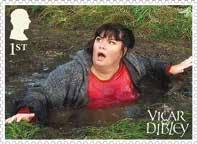


The writer of Call the Midwife has explained that religion is ‘integral’ to the BBC1 show and allows it to cover hard-hitting topics such as ‘female genital mutilation, stillbirth, haemorrhage [and] venereal disease’.
Speaking to The Times, Heidi Thomas said: ‘There’s a quiet faith behind this show. I think [with] noisy radicalism people just put their fingers in their ears, and maybe we can say things and do things and show things in the way we do because people don’t take fright and run away.’
The article also explained how Heidi (pictured) rediscovered her own faith in 2008 while researching the first series of Call the Midwife, which was based on the memoirs of Jennifer Worth. She said that meeting nuns from the community of St John the Divine in Birmingham had a ‘profound effect’ on her and consequently the programme.
‘The thing about religion is it is so integral to the fabric of the show,’ she said. ‘If 50 per cent of your main cast are living the vowed life, the religion takes care of itself. I’ve always been very careful not to either overplay it or underplay it.’
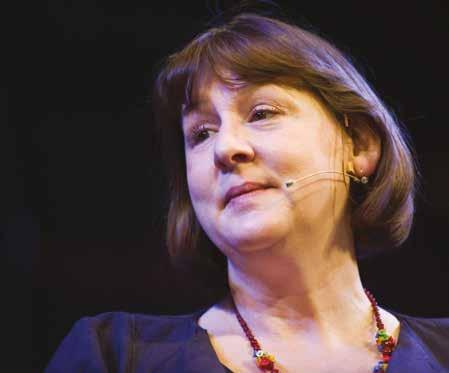

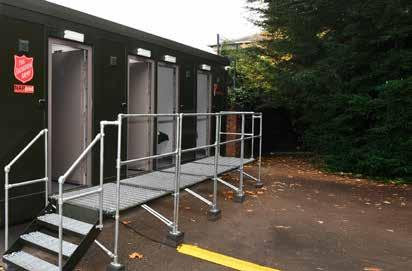
The Salvation Army in Merseyside has launched accommodation pods for people experiencing homelessness.
The NAPpads are four individual heated units equipped with a toilet, sink, bed, duvet and pillow. They provide temporary accommodation for up to three nights to rough sleepers, some of whom have complex health issues.
The portable micro-flats are fitted with sensors which detect if someone stops breathing, enabling responders to attend the scene more quickly.
Located in the car park of The Salvation Army’s Salisbury House, the project will receive referrals from local authorities.
Myles Chadwick, area operations manager for The Salvation Army’s homelessness services across Merseyside, says: ‘Our NAPpads are not designed to be a home, but we are confident that they are a lifeline – and, with the innovative technology included, in some cases could also be a lifesaver.’
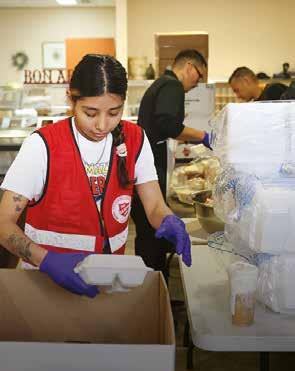
Salvation Army staff and volunteers prepare meals for evacuees at an American Red Cross-operated shelter in Los Angeles
The Salvation Army is serving meals and providing spiritual and emotional care to people evacuated from their homes because of wildfires in southern California.
Working in conjunction with the government and non-profit agencies, staff and volunteers have been helping people at shelters in Los Angeles and Pomona.
Among the Salvation Army personnel serving at the shelters are some who have received mandatory evacuation orders themselves.
In 2025, The Salvation Army celebrates its 160th anniversary. During the year, we will be looking back at some of the history of the church and charity. This time, we turn the clock back to the 19th century to discover some of the opposition that was faced by early members
Feature by Thomas Southgate
In early 1888, the seaside town of Torquay in Devon was famed for its peaceful languor. As a resort, it primarily provided relaxation and leisure, and so was perfectly suited to those sensitive to noise. So it came as a shock when the tranquil sounds of the Devonshire coast were disrupted by drums, horns, tambourines and banjos ringing through the streets, as crowds sang:
They grumble at the music, They grumble at the drum,
They grumble at our marching, To make the people come; They grumble at our uniform And say it’s all display, But still we are the people, That are bound to win the day.
Perhaps improbably, the seaside town of Torquay had become the epicentre of a struggle for religious freedom and freedom of expression, as well as a scene of class conflict. Throughout early 1888, The Salvation Army fought the
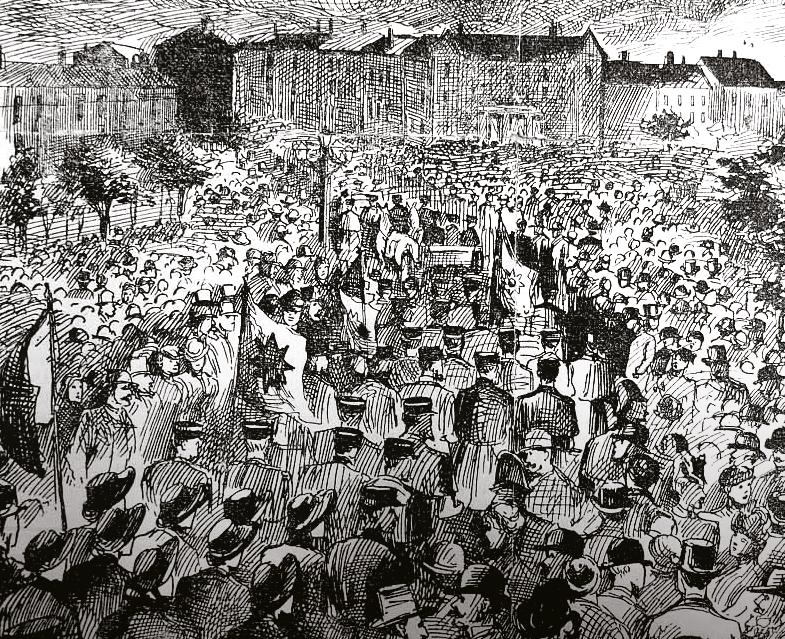
authorities in the Battle of Torquay.
The Battle of Torquay was the culmination of a series of violent attacks on The Salvation Army along the south coast of England. From 1881 to 1888 there were disturbances across Sussex, Dorset and Somerset. Salvationist disruptions would also lead to a series of legal prosecutions in Manchester, Coventry and many other towns and cities. In these places, the authorities and members of the public opposed the open-air prayer, meetings and musical processions of The Salvation Army, deeming them a nuisance.

The Salvationists were also accused of blocking roads and traffic. Local boards banned these musical processions not through common law, but through bylaws.
The opposition may be seen as deeply rooted in class. The early Salvation Army thrived in the industrial towns of Scotland, as well as northern and central England. It benefited from a growing class consciousness alongside the temperance bands, trade unions and co-operative societies. The Salvation Army included former drunkards and ‘fallen women’, attracting those shunned by the genteel sections of Victorian society.
The Battle of Torquay began

inconspicuously when the local board included in the 38th clause of the Torquay and Harbour District Act a ban on all non-military processions on Sundays. The early Salvationists paid little attention to this, perhaps not knowing of it, and in January 1888 after they joined a procession of the local friendly societies, the first prosecutions began. Though early sentences were quashed by the Queen’s Bench, by February convictions were going through.
Rather than pay the fines, these Salvationists chose to serve sentences in Exeter prison. Despite these convictions, the Salvationists refused to be cowed. Led by Major John Roberts, they drew on Salvationists from the surrounding area over the coming months, with some claims of processions over 2,000 strong. As the processions continued, so did the convictions, some Salvationists facing prison more than once. Among those being convicted were gilders,
gardeners, masons, carpenters, stokers, labourers, upholsterers, tailors, plasterers, porters, painters, shoemakers, toll collectors, cabinetmakers, shipwrights and fishermen. All but three of these prisoners can be traced to Torquay or the surrounding area.
Localelites and proprietors organised rioters known as the ‘Skeleton Army’ to oppose the Salvationists in the streets, leading to 669 recorded assaults. However, it was claimed by The Pall Mall Gazette that, because of their practical work in Torquay, ‘The Salvation Army have plenty of friends among the roughs of the town’. The issue was drawing national attention and the Salvationists’ cause being taken up by politicians and national publications.
By the summer, the Torquay board
relented, and the Salvationists asserted that, though they valued respect for the authorities, the word of God stood above the word of man, and they would continue in their duty to preach the gospel. This marked the end of the wave of suppression along the south coast, and from this point The Salvation Army increasingly worked with authorities on their charitable objectives.
The procession leader, John Roberts, would later compare his experience to the suffering of some of God’s people in the Bible. In doing so, he warned the Torquay authorities, as he later recalled: ‘Oh local board, we are not careful to answer thee in this matter, our God whom we serve is able to deliver us out of the cells of Exeter Prison and he will deliver us out of thine hand, oh local board, but if not, be it known unto thee, oh local board, we will not obey thy coercive command, nor pay attention to the 38th section which thou hast inserted in the Torquay Harbour Act.’
To mark Holocaust Memorial Day on Monday (27 January) ELLEN DE
recalls what she learnt from working alongside missionary Corrie ten Boom, who had hidden Jews in her home in occupied Holland during the Second World War
Interview by Emily Bright
On Monday, Holocaust Memorial Day – which remembers the victims of the Holocaust and of other genocides since – marks a sobering anniversary. Eighty years ago, on 27 January 1945, Soviet troops liberated Auschwitz-Birkenau, the largest of all the Nazi concentration and death camps. An estimated 1.1 million men, women and children were murdered there, more than 90 per cent of whom were Jewish.
Among the many different groups interned in concentration camps across Nazi-occupied Europe were members of the underground resistance, including Dutch watchmaker Corrie ten Boom and her sister Betsie. Their Christian family had been saving the lives of Jews by hiding them in their home. After the war Corrie devoted many years to telling the story of those years and speaking of the faith that had strengthened her.
Ellen de Kroon Stamps, who served as Corrie’s secretary from 1967 to 1976,
recalls the first time that they met.
‘I had not planned to work with Corrie, because I had a great job as a nurse in an academic hospital in Utrecht,’ she says. ‘But I always had a longing to work on a mission field, like in India.
‘I visited Corrie but told her: “I cannot type, I cannot speak English. I am dyslexic so know no other languages.” She said: “You cannot do it, but God can do it in you and for you! When can you start?”
‘So,’ she laughs, ‘that’s how we started. I was a nurse. I was very practical. I was not afraid of hard work. That was all Corrie needed. We travelled to churches, where she told her story.’
Their overseas ministry took them to nations such as Germany, Israel, the US, Russia and Cuba. Corrie then decided to commit her story to writing.
‘We lived in Haarlem, in the Netherlands, where her father once had his watchmaker’s shop,’ says Ellen. ‘I stayed home for about a month so that

Corrie could spend time with John and Tibi Sherill to write her autobiography The Hiding Place. That gave me time to work on typing in English and get familiar with Corrie. After she came back home we sat together on the couch day after day and we watched slides of her life.
She did not give up
‘My most memorable experience with Corrie was during the filming of the movie The Hiding Place, which was made in Haarlem,’ Ellen adds. ‘I had to set up all kinds of things, so that the people from the movie could go to the right places. For Corrie and me, all those months there were a very important time.’
As they worked together, Ellen was often struck by Corrie’s determination and resolute faith.
‘When we faced obstacles in ministry, she did not give up on me,’

Auschwitz was the largest Nazi concentration camp
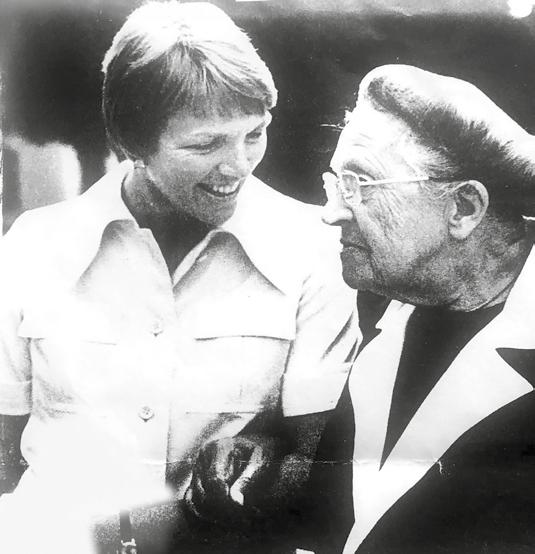
Ellen was Corrie’s secretary for seven years
she remembers. ‘She would always say: “There is no pit so deep that Jesus is not deeper still.” Corrie would always quote Scriptures, saying: “Trust in the Lord with all your heart, and do not lean on your own understanding, Ellen.”
‘She also had little mottos that she would use, like, “Prayer is not a back-up plan, prayer is a battle plan” and “If you look at the world, you will be distressed. If you look within, you will be depressed. But if you look at Jesus, you will be at rest.” She had a wonderful relationship
with Jesus.
‘Corrie leaned on the word of God. She made this her strength, especially in the worst times. When I worked with her, she would pray about the littlest things in her life and would often say of God: “When I am weak, he is strong.”’
Corrie’s steadfast reliance on her faith, which stemmed from childhood, was cemented in the turmoil of war. The family – who lived above their watchmaker’s shop nicknamed the Beje – shared a strong faith and held Bible studies at
their home. After Germany’s invasion of Holland in May 1940 Corrie and the family – her father Casper, sisters Betsie and Nollie and brother Willem – were horrified to witness antisemitic arrests and violence in their community.
In 1942, with the help of resistance contacts, they began smuggling stolen ration cards to Jewish people. Before long, the family became the centre of an
underground movement that spread to the furthest corners of Holland.
Building a false wall, the Ten Booms and friends created a hiding place where Jews could stay. Their work saved the lives of an estimated 800 Jews. The family have subsequently been honoured by Yad Vashem – the world Holocaust remembrance centre – with the title Righteous Among the Nations in recognition of their risking their lives to save Jews during the Holocaust.
Those involved in the underground work at the Beje were well aware of the danger of getting caught, and they took precautions accordingly. But on 28 February 1944, their worst nightmare became a reality.
Someone impersonating a member of the underground network knocked on their door. He told Corrie that his wife had been arrested for hiding Jews, and that he needed money to bribe a policeman to release her. She told him that she could help, but to come back later. The man did – but with the police and Nazi soldiers.
Hearing the noise, Corrie ensured everyone made it into the hiding place safely, and she secured it.
‘Corrie was in bed with a fever and she heard the Jewish people hiding,’ says Ellen. ‘She saw to it that everything was in order. Heavy footsteps came up the staircase. The police came into Corrie’s room, and one of them said: “Do you have Jews?”
‘Corrie said: “No. What are you talking about?” So he hit her, and he asked her

again: “Where do you hide your Jews?” Forced down the staircase, she saw that her entire family and many of the underground workers were already in the living room.
‘The police beat Father ten Boom and the underground workers. Everyone was kicked out of the house and taken to a prison, and the first one was in Haarlem.’
Even once arrested, the family’s first priority was the welfare of the Jewish
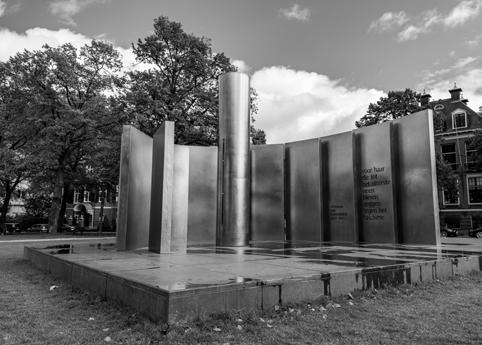
people hiding in their house.
‘Father ten Boom was the last one who came out of the house,’ says Ellen. ‘He saw the old grandfather’s clock that he had pulled the weight on for so many years. He said to the soldier: “Can I, for one time more, pull the weight?” The young soldier let him pull the weight on that clock before he was thrown into the cart and sent to prison. That clock ticked for another 24 hours.
‘Only later in my life, I understood why he had asked that. The clock, which was given to me by Corrie, had tiny machinery that connected with the upstairs hiding place. By pulling the weight, he told the Jews in hiding that it was not safe to get out.’
Corrie asked God: ‘Have you forgotten us?’
The Ten Boom family were transported to a prison in Scheveningen, close to the Hague. Casper fell ill and died in prison days later. Corrie was placed in solitary confinement for three months. Her sister Betsie was imprisoned in a shared cell. From there, the sisters were transferred to Vught, a concentration camp in Holland, before being sent to another: Ravensbrück, Germany – the Nazis’ largest women’s concentration camp.
‘The sisters were such an example in
the worst situation,’ says Ellen. ‘Every night, Corrie would read out of the little Bible that she’d smuggled in. If the authorities had found a Bible on her bed, she would have been killed.
‘But that Bible was her help, and every night, after 12 hours of work, when those women came back, Corrie would read from it. And every night, people would circle around her. The Bible became a strength to those women.’
Despite the strength Corrie and Betsie received from their faith, the brutality of the camp pushed the sisters to breaking point.
‘One day, when they were working, Betsie could not move enough,’ says Ellen. ‘A female guard came and started to beat her. Corrie walked over to where this guard was beating her and put her arms out over Betsie. When her sister turned around, Corrie saw that her face and her arms and everything were beaten up, and she got so angry.
‘But Betsie said: “Don’t hate.” That night, Betsie could barely walk, and Corrie almost carried her sister in. Corrie was so angry and did not want to read out of the Bible that night. But Betsie did.
‘While outside, Corrie said to God: “When I look up, I see the stars and the moon. Nothing is hidden from you. Lord, if you are so big that you can take care of the stars and the moon and the whole world, have you forgotten us?”
‘She hated the guard who had beaten her sister so badly. But she had to forgive her. When she had done that, she walked back into the barracks as she heard Betsie read the words from the Bible. There she was, beaten up, but not giving up. Darkness, but there was light. People all around her, hearts that were open for God’s goodness, even in a barracks in Ravensbrück.’
The horrendous conditions at Ravensbrück took their toll on Betsie, who died in the camp’s hospital on 16 December 1944. Later that month, Corrie was released from internment.
After the war, she was determined to tell her family’s story. Of all places, she went back to Germany first. Ellen recalls
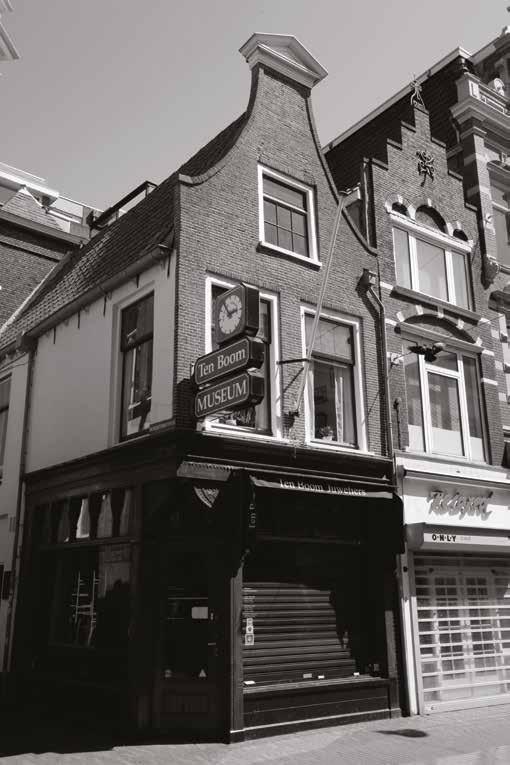
a particularly poignant moment in Corrie’s work.
‘She went to a big church, and she spoke about God’s love and her family’s story. Afterwards, she said: “If there’s any person here who has never given their life to Jesus, then you can come and I’m here to pray with you.” A man walked forward, she looked at him, and she knew his face.
‘He was one of the guards in Ravensbrück. She thought: “This man, who had beaten my sister and other people, has asked me to give his life to Jesus. Lord, I cannot do it.”
‘She looked at this man, and then he said: “Fräulein Ten Boom.” He had never before called her “Fräulein”; he had called her by her number. “Will you forgive me?” Then Corrie knew it was not her forgiveness. It was God’s forgiveness working in her. With that strength, she looked at the man and forgave him.
‘If I think about Corrie’s whole legacy, it has been about this strength to forgive. We cannot do it in our own strength, but God is able.’
The War Cry invites readers to send in requests for prayer, including the first names of individuals and details of their circumstances, for publication. Send your Prayerlink requests to warcry@salvationarmy.org.uk or to War Cry, 1 Champion Park, London SE5 8FJ. Mark your correspondence ‘Confidential’.
There is no set formula to becoming a Christian, but many people have found saying this prayer to be a helpful first step to a relationship with God
Lord Jesus Christ,
I am truly sorry for the things I have done wrong in my life. Please forgive me. I now turn from everything that I know is wrong.
Thank you that you died on the cross for me so that I could be forgiven and set free.
Thank you that you offer me forgiveness and the gift of your Holy Spirit. Please come into my life by your Holy Spirit to be with me for ever.
Thank you, Lord Jesus. Amen
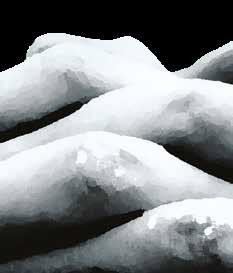
Leviticus
Leviticus is a book of religious and communal law. After the Hebrews’ exodus from Egyptian slavery a priesthood was established, and the rules and regulations about sacrifices and offerings needed to be codified.
The opening chapters give instructions about various offerings. The principle behind many of the sacrifices of animals is as follows: a holy God cannot have anything to do with sin. Humans sin. The breaking of God’s law carries a death sentence. God accepts the death of an animal in the sinner’s place. As a symbol of guilt transference, the sinner lays their hands on the animal’s head, and through the shed blood of a lamb, goat or bull, the person atones for their sin (1:4).
The repeated requirement is that the sacrificed animal must be ‘without defect’.
As well as rules about the priesthood and the observance of the Sabbath and other religious festivals, there are codes of conduct for civil society. Childbirth (chapter 12), skin diseases (chapters 13 and 14), sexual health and conduct (chapter 18), general morality (chapter 19) and debt release (chapter 25) are covered in detail.
Additionally, Leviticus includes instructions for the most sacred ceremony of the Jewish calendar – Yom Kippur, the Day of Atonement (chapter 16). This is the day on which people confess sin and get right with God.

After the priest has made an offering for his sin, he takes two goats as offerings for the Hebrew people. He kills the first goat, enters the holy of holies in the tabernacle and sprinkles its blood on the gold lid of the Ark of the Covenant. This is a sign to God that shed blood has paid for the people’s sin.
The priest then takes the second goat, lays his hands on it and confesses the sins of the people. The animal is then set free into the wilderness – a sign to the people that, because of the shed blood, God has removed their sin from them. This is the original scapegoat.

To receive basic reading about Christianity and information about The Salvation Army, complete this coupon and send it to
War Cry 1 Champion Park London SE5 8FJ
Or email your name and postal address to warcry@salvationarmy.org.uk

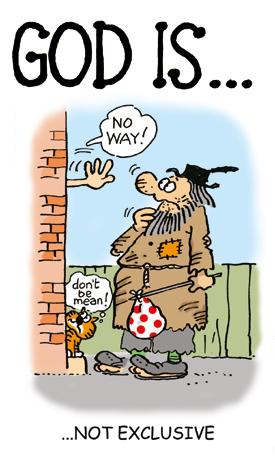
1 2 3 4 5 6
Who plays the title role in the recently revived sitcom Frasier?
Which band had a hit in 1970 with the song ‘Let It Be’?
Who plays the singing Reverend Mother in the film Paddington in Peru?
What is the title of Olympic cyclist Chris Hoy’s memoir published last year?
What does the Spanish word ‘gracias’ mean in English?
What is the capital of Indonesia?
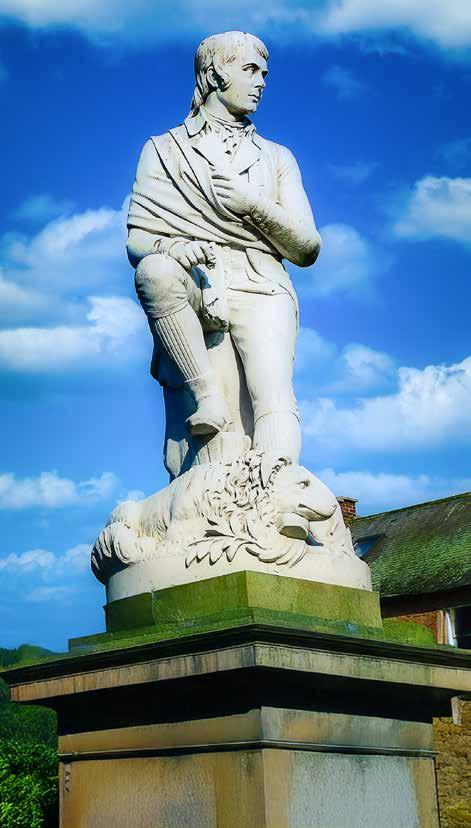
Feature by Ewan Hall
If a haggis is being addressed, it must be Burns Night. On Saturday (25 January), many people will take part in this annual celebration of the life of Robert Burns, also known as Scotland’s bard.
Perhaps this poet, storyteller and composer’s best known work is the song sung by millions as they ring in a new year, ‘Auld Lang Syne’. But Burns Night includes readings of poems including ‘Address to a Haggis’, which celebrates the strength of the ‘ordinary Scotsman’.
The poems are accompanied by a feast of all things Scottish, with the main feature being a supper consisting of haggis, mashed potatoes (champit tatties) and turnips (bashed neeps).
The poet was born in Alloway, Ayrshire, in 1759 to a small tenant farming family. He grew up to use his poetry to express his deep pride in his beloved country. Through his use of humour and sympathy, he captured rural Scottish work life and the struggles of its people.
The joyous occasion of Burns Night is an opportunity to remember a man who loved his country and aimed to capture its characteristics, both the highs and lows. As such a writer, he can be compared with other bards of the past who used their poetry to express their love for something or someone.
Centuries ago, poets used their skills to express their love for God. In the Bible, one such poet wrote: ‘Because of the Lord’s great love we are not consumed, for his compassions never fail./ They are new every morning; great is your faithfulness’ (Lamentations 3:22 and 23 New International Version).
The words express how God’s love is so great that it can stop us from being consumed by our problems, no matter their size. When we put our faith in him, we have a constant and reliable source of compassion towards us.
If we address God with our worries and concerns, we can receive hope and reassurance of his everlasting love all year round.

1. Sleeping area (7)
Tar (5)
Withstands (7)
Cereal (5)
Centre (4)
Systematic (8)
Women (6)
Refutation (6)
Fluent (8)
Additional (4)
Coveted (7)
Eject (4)
Brochure (8)
Attempted (5)
Remember (9)
Very good (9)
Repelled (8)


Worship (7)
Whimper (6)




INGREDIENTS
300g brown rice
1tbsp vegetable oil
1 large onion, halved and sliced
2 garlic cloves, crushed
1tbsp medium curry powder
500g frozen diced sweet potato
250g frozen spinach
500ml boiling water
400g can chickpeas, drained and rinsed


METHOD



Cook the rice according to the packet instructions.
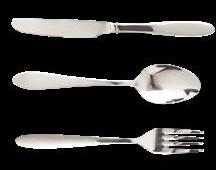
Heat the oil in a large non-stick pan and cook the onion over a medium heat for 2 minutes. Add the garlic and curry powder and cook for a further minute. Add the sweet potato, spinach and boiling water.
Bring to the boil, cover with a lid and simmer over a low heat for 15 minutes, stirring occasionally (If the curry appears dry, add extra boiling water as needed.)

Add the chickpeas and simmer for a further 5 minutes. Serve with the rice.

INGREDIENTS
4 pears, skin on, cored ½ tsp ground ginger
1tsp ground cinnamon
½ tsp mixed spice
500ml boiling water
20g pecans, chopped
METHOD
Cut the pears into bite-sized pieces and add to a medium saucepan with the ginger, cinnamon and mixed spice.
Add enough boiling water to cover the pears, then bring to the boil over a high heat. Reduce the heat

